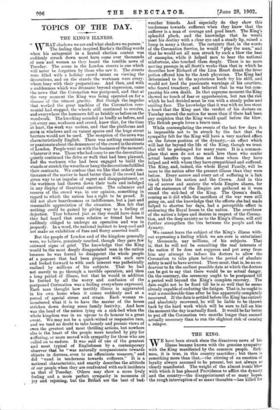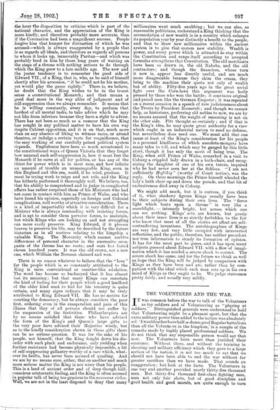THE KING.
WE have been struck since the disastrous news of his illness became known with the genuine sympathy with the King manifested by the common people. Sick- ness, it is true, in this country sanctifies ; but there is something more than that,—the stirring of an emotion of loyalty always assumed to be present, but not always so clearly manifested. The weight of the almost ironic blow with which it has pleased Providence to afflict the dynasty and the country—the disappointment of so many hopes, the rough interruption of so many thouehts—has killed for the hour the disposition to criticise which is part of the national character, and the appreciation of the King is more kindly, and therefore probably more accurate, than if the Coronation had been a magnificent success. People ;forgive him that hunger for distraction of which he was ••accused—which is always exaggerated by a people that is as regards all ideals, and therefore as regards all persons 16 whom it looks up, immovably Puritan—and which was - probably bred in him by those long years of waiting on the steps of a throne with nothing serious to do through which the King grew to a late middle age. The new and the jester tendency is to remember the good side of Edward VII., of a King, that is, who, as he said of himself shortly after his accession, " if he could not be his mother, yet would play the game rightly." There is, we believe, no doubt that the King wishes to be in the truest sense a 4constitutional Monarch ; and that means a good deal more in the way alike of judgment and of Self-suppression than we always remember. It means that he is willing constantly, every day, to perform that hardest of all mental tasks, to take advice which he may not like from inferiors because they have a right to advise. There has not been so much as a rumour that the King has sought in any political matter to have his own way despite Cabinet opposition, and it is on that, much more than on any absence of liking to witness races, or attend theatres, .or indulge a certain taste for magnificence, that the easy working of our carefully poised political system depends. Englishmen have been so much accustomed to the' constitutional ways of Queen Victoria that they forget how unusual such self-suppression is, how it must fret the MonarCh if he cares at all for politics, or has any of the thirst for 'power which is in most men; and how infinite an - amount of trouble • an unmanageable King, even in this England and this era; could, if he tried, produce. - It must be trying work to reign and not rule, and the King has hitherto performed it thoroughly well. We believe, too, that his ability to comprehend and to judge in complicated affairs has rather surprised those of his Ministers who had not come in contact with him as Prince of Wales, and who have found his opinion, especially on foreign and Colonial complications, well worthy of attentive consideration. There is .a kind of impartiality which it is very difficult for a Minister who is always contending with resisting forces, and is apt to consider them perverse forces, to maintain, but which Kings who are looking on and not struggling can more easily preserve. King Edward, if it pleases heaven to preserve his life, may be described by the future historian as in all matters relating to the kingship a valuable King. The Monarchy •which cannot survive differences of personal character in the successive occu- pants of the throne has no roots ; and ours has lasted eleven hundred years. It was the old crown, not a new one; which William the Norman claimed and won.
There is no reason whatever to believe that the "love" for the people which is so constantly attributed to the King is mere conventional or courtier-like adulation. The word has become so hackneyed that it has almost lost its meaning ; but that many Kings can entertain the kind of feeling for their people which a good landlord of the older kind used to feel for his tenantry is quite certain, and many signs indicate that it may be truly attributed to King Edward VII. He has no motive for courting the democracy, but he always considers the poor first, ordering even in the exasperation and pain of this illness that they of all persons should not suffer by the suspension of the festivities. Philanthropists are by no means satisfied that those who have advised the form of the King's and Queen's large gifts to the very poor have advised their Majesties wisely, but as to the kindly consideration shown in those oifts there can be no serious question. It was for the sake of his people, not himself, that the King fought down his dis- order with such pluck and endurance, only yielding when further:resistance had become physically impossible, a bit of self-suppressing gallantry worthy of a race which, what- - ever its faults, has never been accused of quailing. And we are by no means sure, either, that on another and much more serious matter the King is not wiser than his people. This is a land of ancient order and of deep though half- conscious aristocratic feeling, and the King is often accused in popular talk of being too gracious to the nouveaux riches. Well, we are not in the least disposed to deny that many millionaires want much snubbing • but we can also, as reasonable politicians, understand a, king thinking that the accumulation of new wealth is in a country which enlarges its population wear by year distinctly a benefit to the people, and that to -draw new millionaires within the ancient system is to give that system new stability. Wealth is power, and every power which is attracted to stay within the Constitution and range itself according to accepted formulas strengthens that Constitution. The old merchants have been so drawn in, the old Nabobs, and the old contractors ; and though the financiers, whose turn it now is, appear less directly useful, and are much more disagreeable because they skim the cream, they bring to the machine their quota not only of wealth but of ability. Fifty-five years ago in the great social fight over the Corn-laws this argument was hotly pressed by those who won the battle; it convinces original and proud men like the German Emperor; it was repeated on a recent occasion in a speech of rare judiciousness about the Trusts by President Roosevelt; and though we cannot help, as historians, preferring old nobles to new, we are by no means assured that the weight of reasoning is not on the other side. Pitt thought so certainly ; and if that is the King's idea, he may quote great authority for a view which ought in an industrial nation to need no defence, but nevertheless does need one. We must add that one cause at least of the King's consideration for his people is a personal kindliness of which anecdote-mongers have many tales to tell, and which may be gauged by this little story, though it has only the merit of being true. The King, when still Prince of Wales, remarked in a. visit to Coburg a crippled lady drawn in a bath-chair, and recog- nising the daughter of one of his own tutors, inquired why he had never seen her at the Schloss. "1 am not sufficiently Hoffiihig" (worthy of Court notice), was the reply. On three mornings the Prince himself wheeled the lady's bath chair up and down the parade, and that bit of exclusiveness died away in Coburg.
We might add much, but it is curious, if you think of it, what shadowy figures Kings usually have been to their subjects during their own lives. The " fierce light which beats upon a throne " is very like a searchlight, — intensely bright, but across which one can see nothing. Kings' acts are known, but gossip about their inner lives is so strictly forbidden to the few who know that most of all the stories set afloat are self- contradicting inventions. The autobiographies of Kings are very few, and very little occupied with introverted reflections, and the public, therefore, has neither precedent nor true information to steady its formation of opinion. It has for the most part to guess, and it has upon many subjects guessed about Edward VII. with a flow of imagi- nation which it has needed a severe shock to correct. The severe shock has come, and for the future we think as well as hope that the King will be judged by comparison with Kings as they have been and are, rather than by com- parison with the ideal which each man sets up in his own mind of Kings as they ought to be. We judge statesmen pretty fairly, and usually very mildly.



















































 Previous page
Previous page